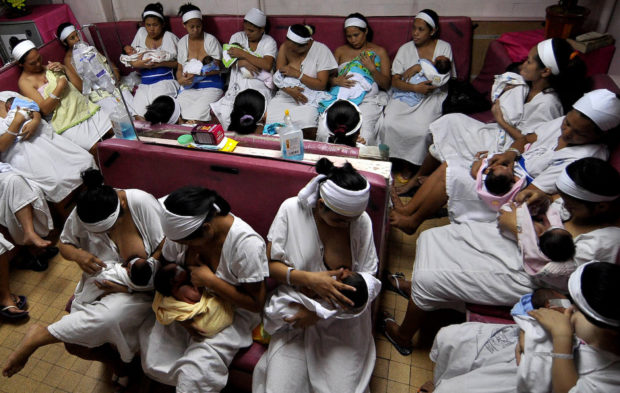PH has breastfeeding laws, policies but campaign needs more push

PIONEER HOSPITAL IN BREAST MILK STORAGE | Mothers breastfeed their newborn babies at a ward designated for that purpose at the Dr. Jose Fabella Memorial Hospital in Santa Cruz, Manila. (File photo by RICHARD A. REYES / Philippine Daily Inquirer)
Jemaima Hernandez, 33, spends a total of about three hours a day — in 15-to-20-minute intervals lasting up to nighttime — breastfeeding the youngest two of her four sons, an 8-month-old and a 2-year-old.
Not many people are aware of the pains that a woman breastfeeding her children goes through.
“It drains you… and leaves you hungry and sleep-deprived while your body is sore,” said Hernandez, a stay-at-home mom who sells afternoon snacks in front of her home in Angono, Rizal province.
But she said she doesn’t mind her discomfort and the time spent nurturing her children, knowing how crucial it is that they get proper nutrition in their formative years.
The Global Breastfeeding Collective (GBC) — a campaign among various international agencies led by the World Health Organization (WHO) and the United Nations Children’s Fund (Unicef) — recommends that each country should have 70 percent of its infants nurtured by breastfeeding by 2030.
Article continues after this advertisementThe Philippines has only seven years left to reach that target. According to the Department of Health (DOH), only about half of the country’s estimated 11.09 million babies were raised by breastfeeding as of 2021.
Article continues after this advertisementGovernment’s role
Both the WHO and Unicef point out government’s key role in promoting breastfeeding, which they say determines the overall quality of a nation’s citizenry as they shape their society and economy.
The two agencies have recommended, among other things, that governments invest in breastfeeding programs, introduce skilled breastfeeding counseling in healthcare facilities, promote maternity protection in the workplace, discourage aggressive marketing of breastmilk substitutes, and monitor the progress of breastfeeding policies and practices.
“Breastfed children perform better on intelligence tests and are less likely to be overweight or obese later in life,” WHO was quoted as saying in the GBC’s 2021 Global Breastfeeding Scorecard.
The agency also noted that, at the very least, breastfeeding is “one of the most effective ways to ensure child health and survival.”
Milk banks
In line with that advocacy, the Philippines has policies and laws promoting breastfeeding, the DOH said.
But “there is [still] a need to promote the importance of breastfeeding and providing infants with breastmilk among Filipino mothers,” Health Assistant Secretary Beverly Ho said at the Feb. 8 launching of a new “human milk bank” at the Dr. Jose Fabella Memorial Hospital in Manila.
She said breast milk storage was introduced in the country in 1999, with the hospital being a pioneer in that effort.
Two decades later, an organization called the Human Milk Bank Association of the Philippines was established with the purpose of facilitating access to breast milk.
There are currently 32 milk banks in various hospitals nationwide, of which 19 are in Metro Manila, said the group’s president, Dr. Estrella Olonan-Jusi, who also attended the launching.
For mothers who are unable to produce milk because of an illness or any other complication, they only need to present a doctor’s prescription to avail themselves of donated breast milk.
Mothers who wish to donate to milk banks must undergo a screening process.
“This is also to ensure that our donor human milk is safe and of good quality,” Jusi said.
Ho cited the health benefits of breast milk both for children and their mothers.
“Children breastfed have a lower risk of asthma, obesity, type 1 diabetes, ear infections, sudden death infant syndrome and gastrointestinal infections,” she said, adding that mothers who choose to breastfeed have lower chances of developing breast cancer, ovarian cancer, type 2 diabetes and hypertension.
Laws on breastfeeding
Meanwhile, there have also been laws encouraging breastfeeding, beginning with Executive Order (EO) No. 51 of 1986 (also known as the Milk Code), Republic Act (RA) No. 7600 or the Rooming-In and Breastfeeding Act of 1992, and its subsequent revision, RA 10028 or the Expanded Breastfeeding Act of 2009.
At the start of the COVID-19 pandemic in 2020, the Department of the Interior and Local Government called the attention of some local governments that included breast milk substitutes in their pandemic relief donations.
The department said this was a violation of EO 51, which prohibits the marketing of these powdered substitutes particularly to “mothers of infants.”
Yet despite that law, some doctors advising mothers who cannot produce milk still recommend that they get substitutes.
Milk supply
Hernandez recalled that when she used powdered milk for her firstborn, now 12 years old, and her second child, now 10, they became prone to retching and diarrhea.
“That was the worst thing that happened to my kids. We went back and forth to the hospital just because I had them drink powdered milk,” she said.
Hernandez now prefers breastfeeding. “Not only does it save me money, but it also doesn’t make my baby sick,” she said.
But she also noted that breast milk is not easy to get “when my… supply is low, especially when I’m exhausted or when I don’t get to eat on time.”
Jusi acknowledged that breast milk supply is “not [always] sustainable” in the milk banks.
“We really need to raise awareness on breastfeeding because even if [some mothers]…use donor human milk for their babies, they need to be given support to be able to produce their own milk,” Jusi said.